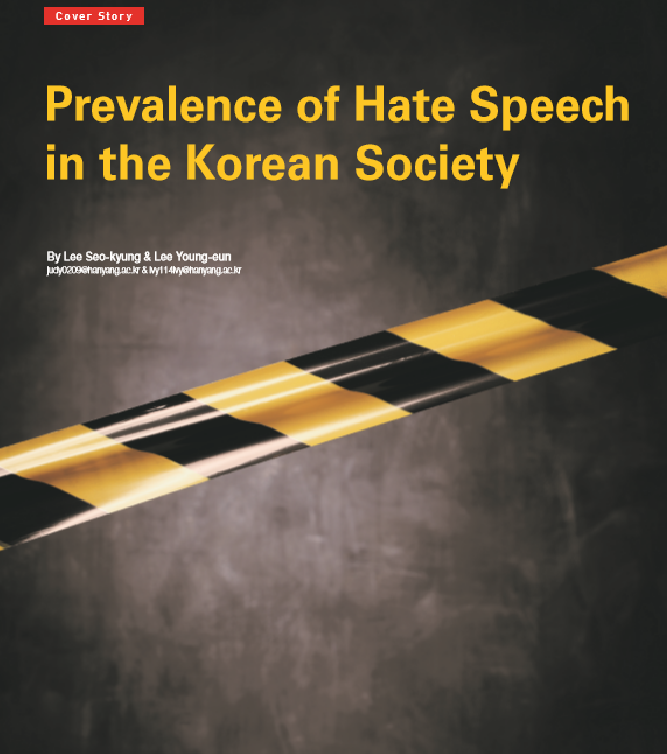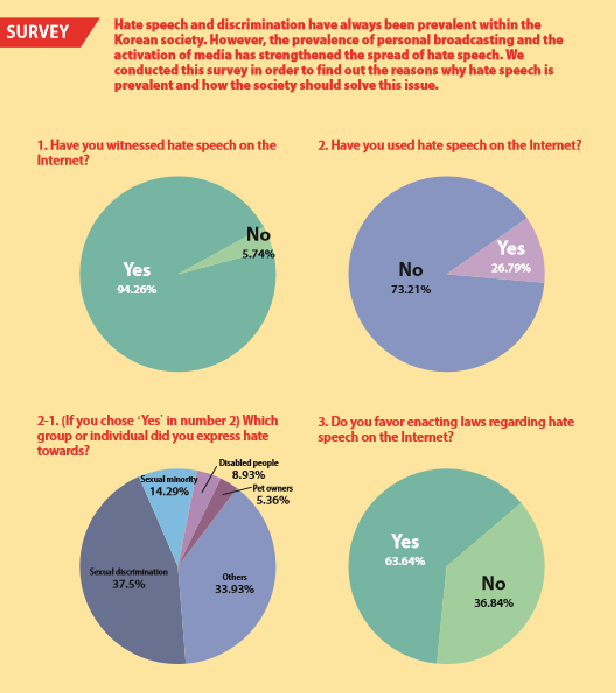
In Korea, it is easy to see Internet users bash each other when interacting. They call each other by hurtful names and use hate speech to attack each other’s integrity. For example, just recently, people have started attacking Po-hang residential members, blaming them for having the Korean SAT delayed.
It is crucial to understand that hate speech has quickly spread in correlation with discrimination. According to ‘M1 Psychology’, the reason why we discriminate is because we feel innately threatened by people who are outside of our social groups. However, Internet users must understand that the words they use to protect themselves are leaving a deep scar on others.
Hate speech is spreading like wildfire due to the Internet and smartphones. Even though these digital devices have made it much easier to meet new people and voice one’s opinion, the following side effects are very damaging.
Social Reasons Behind All the Hatred
On February 2017, the National Human Rights Commission of Korea (NHRCK) used four categories of expression to define hate speech. According to the commission, hate speech is discriminatory harassment, expressions either intending or implying discrimination and/or hatred, public insults, contempt or threats, and incitement to hatred.
One of the social reasons behind why such hateful speech is appearing includes personal broadcasting and social networking, most of which have no specific laws regarding the quality of opinions posted. People, therefore, can openly express their ideas. In this case, hate speech towards social minorities is also becoming more apparent.
Hate speech in Korea can be traced back to the 1990s. According to the Human Rights Sarang-bang Association, hate speech in Korea was based on unresolved conflicts that happened during the 1997 economic crisis. However, they also claimed that the Korean society did not have time to self-examine why hate speech was a problem, until now. “The real problem is the absence of self-reflection and recognition that hate speech was an issue,” said an associate from Sarang-bang.
The Effects of Hate Speech on Social Minorities
Hate speech usually comes in the form of hasty generalization. Hasty generalization is a logical fallacy that occurs when one reaches a conclusion based on insufficient evidence. For example, saying every pet owner in Korea is incapable of keeping pets after a tragic incident of a person being killed would be an example of hasty generalization. One incident does not represent pet owners as a whole.
Again, according to the NHRCK, Korea’s hate speech is strongly misogynistic, meaning that the public holds strong prejudice against women. For instance, mothers who are overly protective of their babies often seem like they are causing harm to others, and thus have been a target for hate speech on the Internet. Internet users call these people “mom-worm”, a derogatory term identifying mothers as worms. The interesting thing is that even though these irresponsible parents are a mere minority and in no way are qualified to represent parents as a whole, the society is slowly evolving to agree with these hate-filled views. Some restaurants and cafés have started to post signs saying ‘No-kids Zone’, openly discriminating these parents from entering.
Another form of hate speech prevalent in Korea is speech directed towards the LGBT community. Hate speech towards sexual minorities often reflects an illogical thought process of some people who discriminate sexual minorities. These expressions openly objectify sexual minorities, and treat them as people with mental illnesses. The widespread hatred for these minority groups is seen by many people on the Internet, which develops into different forms of discrimination in real life.

The Difference Between Hate Speech and the Freedom of Speech
There have been countless debates over hate speech and the freedom of speech. This conflict is especially prominent when hate speech melts into a part of well-known culture. Since popular culture is often practiced without many objections into its moral standards, hate speech flows in and out of people’s minds without adequate filtering. This could also mean that the public is naturally accepting hate speech as the norm, and is no longer recognizing it as a problem.
For example, the film V.I.P., which was released last summer, contained scenes of female characters being raped, tortured, and murdered, resulting in women boycotting the film. At that time, there were two different sides of the debate. Some people said that such scenes were just the director freely expressing himself. However, others thought that those scenes were a bit too much. A female Hanyang University (HYU) student who wanted to remain anonymous said, “It is uncomfortable to see popular culture include hate speech under the name of art. It is easily consumed by many people, so I think the producers of popular culture should be more careful about these expressions.”
One’s freedom of speech is only guaranteed when it does not hinder others’ human rights. In the instance of hate speech, the targeted minority groups often feel threatened and are unable to voice their opinions. Professor Hong Sung-soo from Sookmyung Women’s University explained, “People who were exposed to hate speech showed negative psychological reactions, such as somatization symptoms and stress, which related to suicidal impulses and depression. Furthermore, these people even resigned and took time off from school in order to recover from the shock.” Therefore, there is a need to set a limit on the expressions that incite discrimination against vulnerable members of society.
Possible Regulations to Hinder Hate Speech
In Korea, if hate speech is categorized as libel and slander, offenders can be punished according to penal regulations. However, there are no laws regulating and preventing the use of hate speech. Things are quite different in Europe. In Germany, for example, strict laws fine social network companies such as Twitter or Facebook up to 50 million euros if they do not delete the posts and videos including hate speech within 24 hours.
To deal with this matter, the Korean government has been doing its best, but there are some limits to enacting and administering such a law. Professor Lee Ho-yong from the Department of Policy Studies of HYU said, “Creating a law that regulates hate speech is hard because the criteria of hate speech are so vague. The feeling of dislike and hatred depends on the person receiving it. Then there is always the problem of hate speech being categorized under free speech.” Additionally, Professor Lee explained, “Because there are some realistic difficulties in creating the legislation, public education campaigns are needed. Also, the NGOs (Non-Governmental Organizations) in Korea should take an important role and try to lead members within the society to stop the spread of hate.”
Actually, there are many incidents where NGOs have been active in our society, trying to stop hate speech. For instance, during the 45th presidential debate, one candidate asked, “Do you favor or oppose same-sex marriage?” and this was criticized by LGBT rights organizations. These groups held a demonstration to demand apologies from the candidates who encouraged hate against the LGBT community. Likewise, many NGOs have been trying to protect the rights of the weak and publicize incidents related to hate speech.
No More Hate in Korea
Because the boundary between hate speech and the freedom of expression is too ambiguous, neither the government nor the public has found sure solutions to this matter yet. This, however, does not mean that they should stop trying.
If people continue to use hate speech, they cannot respect the diversity of individuals. Oh Chang-ik, the Secretary General of the Citizens’ Solidarity for Human Rights (CSHR) in Korea, said, “First, basic education is needed. People are innately different, but the minorities in our society are discriminated by these differences. Amongst the discrimination, the worst is discriminating against people by what they cannot choose, such as their gender, hometown, and sexual orientation. Students should learn that it is a morally wrong behavior. This is what we call human rights education. If hate speech is not truly stopped, the vicious cycle will happen over and over again.”
Something that might be a free speech to someone could be a pain for another. Hate speech should never be justified nor understood, and both individuals and nations should continue to fight against hate speech.

